Once mostly immune from the country’s post-coup turmoils, Rakhine State is beset by an increasingly devastating conflict.
By Kyaw Hsan Hlaing
November 22, 2022
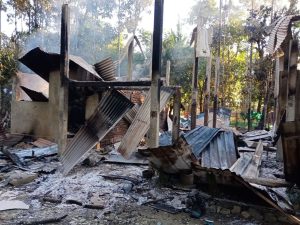
The aftermath of an attack on a village by junta forces in Ponnagyun township, Rakhine State, on November 11, 2022.
Credit: Photo Supplied
About four months after fighting resumed between Myanmar’s military junta and the Arakan Army (AA) in western Myanmar’s Rakhine State, junta forces are increasingly resorting to airstrikes and artillery barrages against civilian populations, amid reported losses on the ground. One of Myanmar’s most powerful and well-organized ethnic revolutionary groups, the AA, which was formed by 26 Rakhine youths in 2009 under the guidance of the Kachin Independence Army (KIA) to fight for greater autonomy for the people of Rakhine State, now claims to have 30,000 troops under arms.
The recent fighting shattered an informal ceasefire agreement that the AA signed with the Myanmar military in November 2020, just before that month’s general election. This ended two years of intense fighting in northern Rakhine and southern Chin State. Soon after the military seized power in a coup in February last year, the junta offered several favors to the AA and Rakhine people to maintain the ceasefire, releasing from its custody several people including Rakhine nationalist politician Dr. Aye Maung and the family members of AA leaders. It also ended the two-year internet restriction in northern Rakhine and removed the AA from its list of “terrorist” organizations.
During the lull in fighting, the AA’s political wing, the United League of Arakan (ULA), focused on developing its administrative and judicial institutions across Rakhine State. As the ULA administration grew, the junta started making attempts to contain this administrative expansion and reinforced its troops in the area. Then, in early June, the AA refused an invitation to join junta-hosted peace talks in the capital Naypyidaw, soon after which junta forces began arresting dozens of people affiliated with the AA in northern Rakhine townships and blocked the gates of these towns. The AA responded by arresting at least 20 junta personnel in the areas of Rakhine State under its control.
On July 4, the tension between both exploded after the junta launched an airstrike against an AA base in a territory controlled by the Karen National Union in eastern Myanmar, killing at least six soldiers and injuring many others. A week later, the AA launched a retaliatory attack against junta forces in northern Rakhine, killing at least four, injuring many others, and capturing at least 14 alive.
In early August, a series of armed clashes between the AA and junta forces erupted in three locations in northern Rakhine, and another one in the southern part of neighboring Chin State.
About four months after fighting resumed between Myanmar’s military junta and the Arakan Army (AA) in western Myanmar’s Rakhine State, junta forces are increasingly resorting to airstrikes and artillery barrages against civilian populations, amid reported losses on the ground. One of Myanmar’s most powerful and well-organized ethnic revolutionary groups, the AA, which was formed by 26 Rakhine youths in 2009 under the guidance of the Kachin Independence Army (KIA) to fight for greater autonomy for the people of Rakhine State, now claims to have 30,000 troops under arms.
The recent fighting shattered an informal ceasefire agreement that the AA signed with the Myanmar military in November 2020, just before that month’s general election. This ended two years of intense fighting in northern Rakhine and southern Chin State. Soon after the military seized power in a coup in February last year, the junta offered several favors to the AA and Rakhine people to maintain the ceasefire, releasing from its custody several people including Rakhine nationalist politician Dr. Aye Maung and the family members of AA leaders. It also ended the two-year internet restriction in northern Rakhine and removed the AA from its list of “terrorist” organizations.
During the lull in fighting, the AA’s political wing, the United League of Arakan (ULA), focused on developing its administrative and judicial institutions across Rakhine State. As the ULA administration grew, the junta started making attempts to contain this administrative expansion and reinforced its troops in the area. Then, in early June, the AA refused an invitation to join junta-hosted peace talks in the capital Naypyidaw, soon after which junta forces began arresting dozens of people affiliated with the AA in northern Rakhine townships and blocked the gates of these towns. The AA responded by arresting at least 20 junta personnel in the areas of Rakhine State under its control.
On July 4, the tension between both exploded after the junta launched an airstrike against an AA base in a territory controlled by the Karen National Union in eastern Myanmar, killing at least six soldiers and injuring many others. A week later, the AA launched a retaliatory attack against junta forces in northern Rakhine, killing at least four, injuring many others, and capturing at least 14 alive.
In early August, a series of armed clashes between the AA and junta forces erupted in three locations in northern Rakhine, and another one in the southern part of neighboring Chin State.
The Rakhine War at a Glance
As of November 17, based on local news and statements from the AA, the author has identified around 100 battles that have broken out between the junta forces and the Arakan Army since July, while more than 15 clashes could be classified as fierce battles based on the intensity of clashes.
The four townships in which these clashes occurred are Maungdaw, Buthedaung, and Rethedaung townships in northern Rakhine and Paletwa township in Chin State. Other less frequent, small-scale armed clashes and mine explosions also happened in central and southern townships such as Kyauktaw, Mrauk U, Minbya, Maybone, Taunggok, and Ann. The most frequent clashes took place in Patetwa and Maungdaw, both of which possess international borders and thus have greater geostrategic significance.
During these clashes, more than 150 Myanmar junta soldiers are believed to have been killed, although the exact number is hard to determine. The exact number of casualties from the AA side is also hard to identify due to a lack of news reports, but at least 10 are reported to have died or been injured.
During the three months from August to October, at least 204 civilians were arbitrarily arrested by the junta, at least 62 of which remain in detention. The AA has responded by arresting at least 8 junta personnel in the areas of Rakhine State under its control.
Of those detained by the junta, at least 29 were members of its administrative apparatus, including school teachers, doctors, and people from the General Administration Department, who were accused of paying taxes or donating money to the ULA. They also include social workers accused of otherwise aiding AA members and civilians displaced by the conflict.
Apart from this, since the junta blocked the United Nations and international NGOs from accessing the six townships of northern Rakhine State on September 16, the residents, especially thousands of internally displaced people (IDPs), have faced shortages in food, shelter, and other relief items. Last month, the United Nations noted that the situation in Rakhine was “of particular concern” and that more than 17,400 people, including Rohingya, had been displaced.
Since fighting resumed after a brief pause in early August, junta forces have also blocked highways and roads linking the state capital Sittwe to both the commercial center Yangon and Rathedaung to Maungdaw in northern Rakhine.
Mounting Mass Atrocities
As the junta forces have lost ground to the AA and other ethnic resistance groups across Myanmar, it has reportedly come to rely more heavily on airstrikes on its opponents, in particular through targeting populations of unarmed civilians believed to support them.
The Irrawaddy reported that from October 1 to 28, the junta launched a total of 28 aerial attacks in five regions including Rakhine, leaving 111 dead and injuring at least 126. In particular, the recent brutal junta airstrike on a concert in Kachin State in the north of the country, killing more than 60 people and injuring many more. As of October 31 in Rakhine, at least seven aerial attacks have taken place since July, killing at least 18 civilians, including seven children, and injuring at least 31.
In addition to airstrikes, the junta ramped up its artillery offensives in Rakhine State in the first two weeks of November. In the six days between November 10 to 16, artillery shells killed at least 17 civilians and injured at least 50 in northern Rakhine.
November 16 was a particularly deadly day. According to local media reports, at least 11 civilians including three children were killed and at least 27 others were wounded after four mortar shells were launched into Jeitchaung village in northern Maungdaw township. On the same day, in Kyauktaw township, at least four residents were killed and three people, including a grade 9 student, were wounded in an artillery strike on Chaungtu Village.
Ten days earlier, junta soldiers from the military’s Ponnagyun-based Light Infantry Battalion No. 550 also shot and killed at least nine civilians, mainly elderly people including a 92-year-old woman, and burned at least 10 houses in Hsininngyi village, Ponnagyun township.
To sum up, in just the first 16 days of November, the numbers of junta atrocities in Rakhine State were greater than in the previous three months. From August to October, around 20 civilians were killed and 30 were injured due to artillery shells and airstrikes. Within 16 days of November, at least 36 including children and elders were killed, and at least 72 were injured. There were at least 12 civilian deaths and at least 39 injuries in Kyauktaw alone.
As the armed conflict between the junta forces and the AA escalates, and inevitably spreads to southern Rakhine – the latter issued a statement on November 11, vowing to retaliate against junta forces – the Myanmar military will undoubtedly launch airstrikes and artillery attacks on these areas as well. Despite nearly two years of relative peace in Rakhine, civilian casualties are once again on the rise and the humanitarian situation across the state is steadily worsening.
To sum up, in just the first 16 days of November, the numbers of junta atrocities in Rakhine State were greater than in the previous three months. From August to October, around 20 civilians were killed and 30 were injured due to artillery shells and airstrikes. Within 16 days of November, at least 36 including children and elders were killed, and at least 72 were injured. There were at least 12 civilian deaths and at least 39 injuries in Kyauktaw alone.
As the armed conflict between the junta forces and the AA escalates, and inevitably spreads to southern Rakhine – the latter issued a statement on November 11, vowing to retaliate against junta forces – the Myanmar military will undoubtedly launch airstrikes and artillery attacks on these areas as well. Despite nearly two years of relative peace in Rakhine, civilian casualties are once again on the rise and the humanitarian situation across the state is steadily worsening.
GUEST AUTHOR
Kyaw Hsan Hlaing
Kyaw Hsan Hlaing is an independent journalist and researcher, writing on human rights, political transitions, and issues related to the civil war and the military coup in Myanmar. Follow him on Twitter @kyawhsanhlaing1
ANZ set to pull out of pariah state Myanmar after facing 'increasing operational complexity'
By foreign affairs reporter Stephen Dziedzic
Posted Mon 21 Nov 2022

ANZ has announced it will pull out of Myanmar, dealing a blow to the country's military junta and potentially ramping up pressure on other overseas banks to turn their backs on the regime.
Key points:
Activists revealed last month it had facilitated payments into a Myanmar military-controlled bank
ANZ said it had been facing "increasing operational complexity" in the country in recent months
In a brief statement issued on Tuesday afternoon, the major Australian bank said it would cease its Myanmar operations by early next year "subject to local regulatory approval".
The move has been welcomed by activists who took aim at ANZ earlier this month after leaked records showed the bank had facilitated at least a handful of payments that foreign companies hold with a military-controlled bank in Myanmar.
ANZ said it had been facing "increasing operational complexity" in Myanmar over the past several months, and was "working with its institutional customers to transition to alternative banking arrangements".
"The decision follows careful consideration of the local operating conditions," said ANZ's international managing director, Simon Ireland.
"We thank the team for working tirelessly to support our customers during this time.
"Our international network and supporting the trade and capital flows of our customers around the region is a critical part of our strategy, and will continue to be for the long term."
Australia under pressure to sanction Myanmar junta
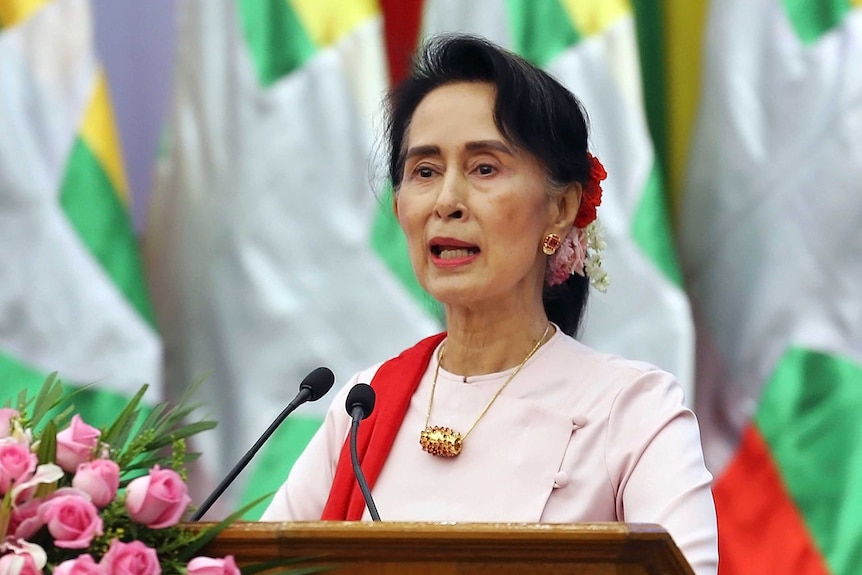
ANZ facilitated deposits into military-owned bank
The announcement comes after it was revealed that ANZ facilitated deposits for international companies into accounts they hold with Innwa Bank – which is owned by a military conglomerate, the Myanmar Economic Corporation (MEC).
The United States, the United Kingdom and the European Union have all imposed sanctions on the MEC as part of a broader attempt to financially isolate the military junta, but Australia has yet to do the same.
The transactions totalled around $5,000 and were paid on behalf of a Malaysian telco infrastructure provider edotco, and a Hong Kong based insurer AIA.
The bank said at the time the transactions were made in Myanmar's local currency rather than US dollars, and it said it would be "misleading and deceptive" to suggest it breached sanctions.
But activists said dealing with the Innwa Bank – which plays a crucial role in helping the junta access the international financial system and fund military controlled businesses – was still morally inexcusable.
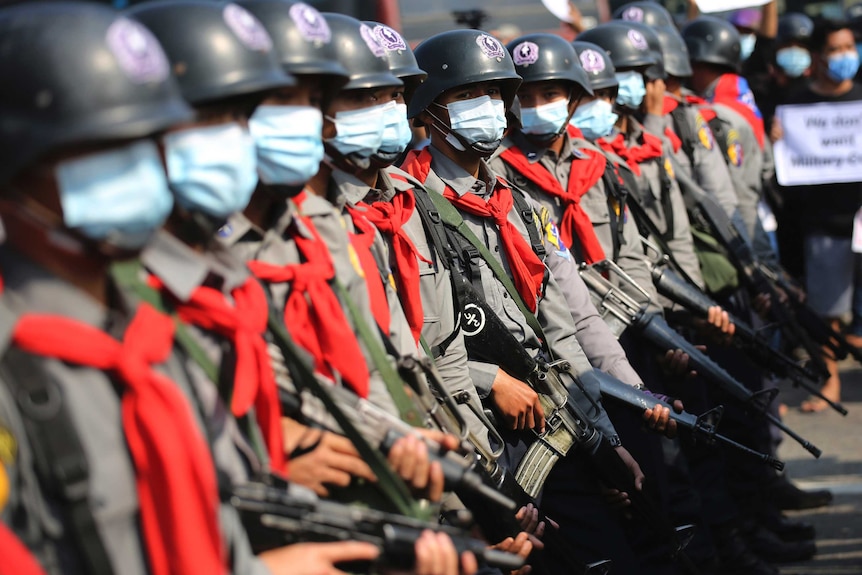
By foreign affairs reporter Stephen Dziedzic
Posted Mon 21 Nov 2022
ANZ's decision to pull out of Myanmar is likely to be welcomed by activists.
(AAP Image: Sergio Dionisio)
ANZ has announced it will pull out of Myanmar, dealing a blow to the country's military junta and potentially ramping up pressure on other overseas banks to turn their backs on the regime.
Key points:
The bank is set to finish up operations in Myanmar by early next year
Activists revealed last month it had facilitated payments into a Myanmar military-controlled bank
ANZ said it had been facing "increasing operational complexity" in the country in recent months
In a brief statement issued on Tuesday afternoon, the major Australian bank said it would cease its Myanmar operations by early next year "subject to local regulatory approval".
The move has been welcomed by activists who took aim at ANZ earlier this month after leaked records showed the bank had facilitated at least a handful of payments that foreign companies hold with a military-controlled bank in Myanmar.
ANZ said it had been facing "increasing operational complexity" in Myanmar over the past several months, and was "working with its institutional customers to transition to alternative banking arrangements".
"The decision follows careful consideration of the local operating conditions," said ANZ's international managing director, Simon Ireland.
"We thank the team for working tirelessly to support our customers during this time.
"Our international network and supporting the trade and capital flows of our customers around the region is a critical part of our strategy, and will continue to be for the long term."
Australia under pressure to sanction Myanmar junta
Australia is an outlier among like-minded countries, including the United States, United Kingdom, Canada and the European Union, all of which have imposed tough sanctions on Myanmar's military rulers since the coup on February 1 last year.
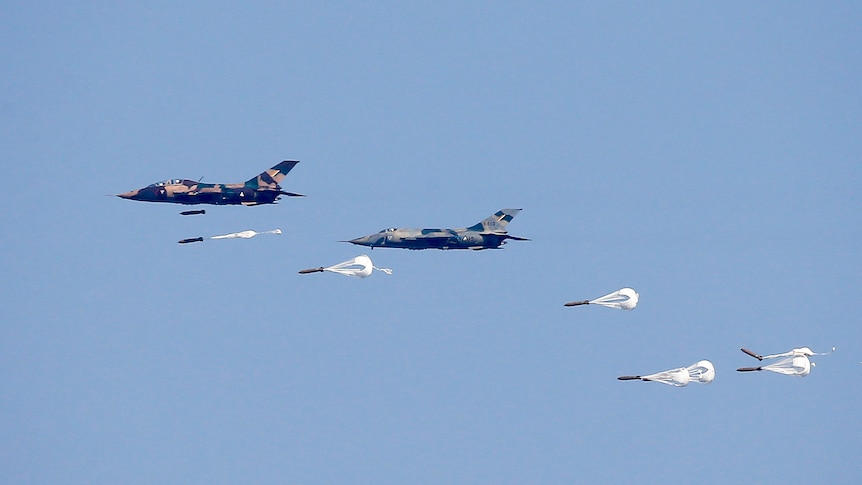
ANZ doesn't have a huge presence in Myanmar, with a small team of around two dozen local staff in the country.
Still, it's one of the first major overseas financial institution to leave Myanmar, and the decision means by early next year no substantial Western banks will remain in the country.
Multinational companies who bank with ANZ and operate in the country will now have to find an alternative at a time when the junta is grappling with US-led sanctions.
Civil society groups will also hope that the announcement will help ramp up pressure on other banks – including institutions based in Singapore and Japan – to announce they will also withdraw from the country.
A host of other multinationals – including Telenor and energy giant Woodside — have already announced they're leaving Myanmar in the wake of the military coup that ousted Aung San Suu Kyi's government in February last year.
Myanmar has also been increasingly turning towards Russian banks for finance as it grows more isolated from Western financial institutions.
ANZ doesn't have a huge presence in Myanmar, with a small team of around two dozen local staff in the country.
Still, it's one of the first major overseas financial institution to leave Myanmar, and the decision means by early next year no substantial Western banks will remain in the country.
Multinational companies who bank with ANZ and operate in the country will now have to find an alternative at a time when the junta is grappling with US-led sanctions.
Civil society groups will also hope that the announcement will help ramp up pressure on other banks – including institutions based in Singapore and Japan – to announce they will also withdraw from the country.
A host of other multinationals – including Telenor and energy giant Woodside — have already announced they're leaving Myanmar in the wake of the military coup that ousted Aung San Suu Kyi's government in February last year.
Myanmar has also been increasingly turning towards Russian banks for finance as it grows more isolated from Western financial institutions.
Aung San Suu Kyi is in prison after her government was overthrown last year in a military coup. (AP: Aung Shine, file)
ANZ facilitated deposits into military-owned bank
The announcement comes after it was revealed that ANZ facilitated deposits for international companies into accounts they hold with Innwa Bank – which is owned by a military conglomerate, the Myanmar Economic Corporation (MEC).
The United States, the United Kingdom and the European Union have all imposed sanctions on the MEC as part of a broader attempt to financially isolate the military junta, but Australia has yet to do the same.
The transactions totalled around $5,000 and were paid on behalf of a Malaysian telco infrastructure provider edotco, and a Hong Kong based insurer AIA.
The bank said at the time the transactions were made in Myanmar's local currency rather than US dollars, and it said it would be "misleading and deceptive" to suggest it breached sanctions.
But activists said dealing with the Innwa Bank – which plays a crucial role in helping the junta access the international financial system and fund military controlled businesses – was still morally inexcusable.
Myanmar's military has business interests across all sector's of the country's economy. (AP)
Justice For Myanmar spokesperson Yadanar Maung said the group "cautiously welcomed" ANZ's decision and called on the company to "responsibly exit" the country.
"This must involve mitigating and remedying the impact on their staff and ensuring that they repatriate all funds so they do not leave a windfall for the terrorist military junta," she said.
Australia to prioritise visas for Myanmar nationals fleeing junta
Justice For Myanmar spokesperson Yadanar Maung said the group "cautiously welcomed" ANZ's decision and called on the company to "responsibly exit" the country.
"This must involve mitigating and remedying the impact on their staff and ensuring that they repatriate all funds so they do not leave a windfall for the terrorist military junta," she said.
Australia to prioritise visas for Myanmar nationals fleeing junta
The government says it will send $135 million in aid and prioritise onshore protection visas for people from the South-East Asian nation.
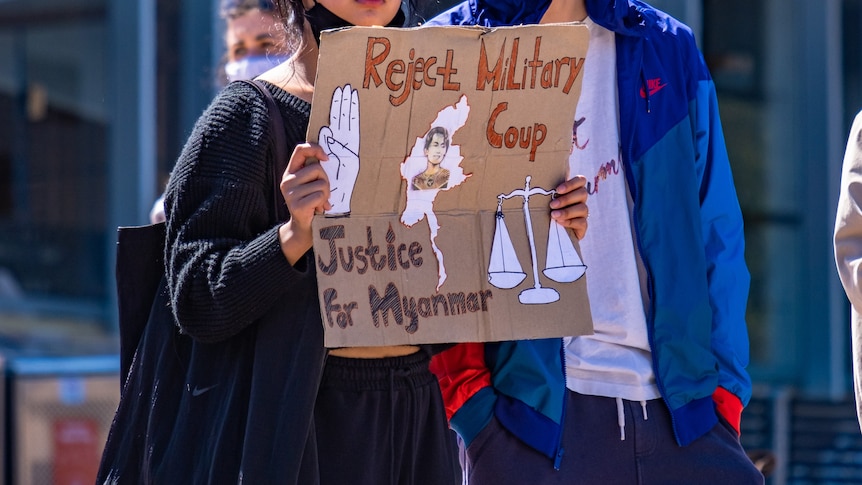
"ANZ is the first international bank to leave Myanmar and their planned exit is another sign of the destruction the junta is causing to Myanmar's economy through their coup attempt, war of terror and proliferation of illicit business activities under control of, or profiting the military, and its associates."
Ms Maung also said ANZ's past record highlighted the need for Australia to hit the junta with fresh sanctions.
"Since the military's illegal attempted coup, ANZ has transacted with the US, UK and EU sanctioned Innwa Bank and facilitated customer payments to the military junta, enabled by the refusal of the Australian government to sanction the junta and its businesses," she said.
"The Australian government's appalling inaction in response to the crisis in Myanmar undermines its democratic values and international obligations."
Human Rights Watch Asia director Elaine Pearson said ANZ's announcement was "welcome" but also "underscores why targeted sanctions by the Australian government are more than just 'virtue signalling'."
"The lack of targeted sanctions by the Australian government has reportedly enabled Australian companies to continue to do business with junta-controlled entities that have been sanctioned by other governments," she said.
"Sean Turnell is out now, so the Australian government should stop dragging its feet and act in the interests of the people of Myanmar.
"The Myanmar junta will not end its brutality unless there is a strong coordinated effort to impose financial pressure on junta-controlled entities."
"ANZ is the first international bank to leave Myanmar and their planned exit is another sign of the destruction the junta is causing to Myanmar's economy through their coup attempt, war of terror and proliferation of illicit business activities under control of, or profiting the military, and its associates."
Ms Maung also said ANZ's past record highlighted the need for Australia to hit the junta with fresh sanctions.
"Since the military's illegal attempted coup, ANZ has transacted with the US, UK and EU sanctioned Innwa Bank and facilitated customer payments to the military junta, enabled by the refusal of the Australian government to sanction the junta and its businesses," she said.
"The Australian government's appalling inaction in response to the crisis in Myanmar undermines its democratic values and international obligations."
Human Rights Watch Asia director Elaine Pearson said ANZ's announcement was "welcome" but also "underscores why targeted sanctions by the Australian government are more than just 'virtue signalling'."
"The lack of targeted sanctions by the Australian government has reportedly enabled Australian companies to continue to do business with junta-controlled entities that have been sanctioned by other governments," she said.
"Sean Turnell is out now, so the Australian government should stop dragging its feet and act in the interests of the people of Myanmar.
"The Myanmar junta will not end its brutality unless there is a strong coordinated effort to impose financial pressure on junta-controlled entities."
Australian Sean Turnell tells of Myanmar jail squalor, torture fear

A handout photo shows Australian economic adviser Sean Turnell (right) and Australian Chargé d'Affaires to Myanmar Angela Corcoran, after Turnell's release from Insein prison in Yangon. ― AFP pic

A handout photo shows Australian economic adviser Sean Turnell (right) and Australian Chargé d'Affaires to Myanmar Angela Corcoran, after Turnell's release from Insein prison in Yangon. ― AFP pic
=
Tuesday, 22 Nov 2022
SYDNEY, Nov 22 ― An Australian economist released last week after nearly two years in a Myanmar jail today told of interrogations in leg irons, squalor and the sounds of screams from tortured cellmates.
Sean Turnell, who returned home to Sydney on Friday after being released as part of an amnesty of almost 6,000 prisoners, gave the first public details of his incarceration in an interview with The Australian newspaper.
The former adviser to deposed Myanmar leader Aung San Suu Kyi was detained by the military in February 2021 shortly after its forces seized control of the country.
Turnell told the paper he was initially kept at Yangon's Insein prison in a six metre by 2.5 metre concrete cell in which an iron chair with leg irons had been bolted to the floor.
He then endured two months of interrogations, the paper said, sometimes being taken from his bed to be locked in the irons.
Officials accused him of working for British intelligence and gun-running, and quizzed him about his work for Suu Kyi, the economist was quoted as saying.
He told the paper he was infected with Covid-19 five times and kept in solitary confinement for months.
In the early days of his confinement, Turnell said he could hear the sounds of people outside banging pots and pans at night in protest against the military coup.
“Then came the explosions and gunfire and people being tortured in rooms nearby. I thought, they're not going to do that to me surely? Then after a while, I started thinking, maybe they will. I think they wanted me to hear it.”
'Ate out of a bucket'
Turnell said he had expected to be treated “with kid gloves”.
“They didn't stick electrodes to me, but I was thrown into filthy cells. The food they used to deliver to me (came) in a bucket. For 650 days, I ate out of a bucket.”
In the Naypyidaw detention centre, to which he was later transferred, “it wasn't even a new bucket, they were paint buckets”, he said.
“They didn't beat me, but they did push and shove me.”
In Naypyidaw, prisoners were locked away for 20 hours a day, Turnell said.
“In the monsoon, the roof would leak and we would sit there all night sometimes with water just pouring down through the roof, clutching your clothes and blanket to try to keep them dry,” he said.
Turnell said his wife, Ha Vu, an economist at Australia's Macquarie University, helped him survive with phone chats and by regularly sending books, cookies and cake through the Australian embassy.
The economist was sentenced in September to three years' imprisonment for breaching Myanmar's Official Secrets Act ― charges he denied ― before being released in last week's amnesty along with former British ambassador Vicky Bowman and Japanese journalist Toru Kubita. ― AFP
Tuesday, 22 Nov 2022
SYDNEY, Nov 22 ― An Australian economist released last week after nearly two years in a Myanmar jail today told of interrogations in leg irons, squalor and the sounds of screams from tortured cellmates.
Sean Turnell, who returned home to Sydney on Friday after being released as part of an amnesty of almost 6,000 prisoners, gave the first public details of his incarceration in an interview with The Australian newspaper.
The former adviser to deposed Myanmar leader Aung San Suu Kyi was detained by the military in February 2021 shortly after its forces seized control of the country.
Turnell told the paper he was initially kept at Yangon's Insein prison in a six metre by 2.5 metre concrete cell in which an iron chair with leg irons had been bolted to the floor.
He then endured two months of interrogations, the paper said, sometimes being taken from his bed to be locked in the irons.
Officials accused him of working for British intelligence and gun-running, and quizzed him about his work for Suu Kyi, the economist was quoted as saying.
He told the paper he was infected with Covid-19 five times and kept in solitary confinement for months.
In the early days of his confinement, Turnell said he could hear the sounds of people outside banging pots and pans at night in protest against the military coup.
“Then came the explosions and gunfire and people being tortured in rooms nearby. I thought, they're not going to do that to me surely? Then after a while, I started thinking, maybe they will. I think they wanted me to hear it.”
'Ate out of a bucket'
Turnell said he had expected to be treated “with kid gloves”.
“They didn't stick electrodes to me, but I was thrown into filthy cells. The food they used to deliver to me (came) in a bucket. For 650 days, I ate out of a bucket.”
In the Naypyidaw detention centre, to which he was later transferred, “it wasn't even a new bucket, they were paint buckets”, he said.
“They didn't beat me, but they did push and shove me.”
In Naypyidaw, prisoners were locked away for 20 hours a day, Turnell said.
“In the monsoon, the roof would leak and we would sit there all night sometimes with water just pouring down through the roof, clutching your clothes and blanket to try to keep them dry,” he said.
Turnell said his wife, Ha Vu, an economist at Australia's Macquarie University, helped him survive with phone chats and by regularly sending books, cookies and cake through the Australian embassy.
The economist was sentenced in September to three years' imprisonment for breaching Myanmar's Official Secrets Act ― charges he denied ― before being released in last week's amnesty along with former British ambassador Vicky Bowman and Japanese journalist Toru Kubita. ― AFP
No comments:
Post a Comment